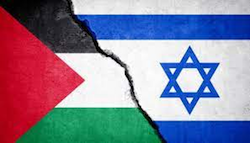GARY KENT argues that humanitarian pauses are the best hope at this moment to relieve the suffering in Gaza, before they can be turned into truces or a ceasefire and political settlement.
We are all weeping at the terrible scenes in Israel and Gaza. Let’s recall the moving stanza in WH Auden’s emotional poem, ‘The Shield of Achilles’:
“The mass and majesty of this world, all
That carries weight and always weighs the same
Lay in the hands of others; they were small
And could not hope for help and no help came:
What their foes like to do was done, their shame
Was all the worst could wish; they lost their pride
And died as men before their bodies died.”
The next question is: what should be done about the unbearable suffering in Israel and Gaza?
The ILP has a proud record in another, albeit smaller and less bloody, conflict that revolved around competing rights, aspirations, and ancestral voices on narrow ground: Northern Ireland.
 From the 1970s to the end of the century, the ILP refused to take a one-sided approach that ignored a complex history. It refused the hard-left’s false framing of Northern Ireland as a failed, artificial, and Orange state, although there were grains of truth in that. And it refused to endorse demands such as Troops Out Now which would have given an advantage to paramilitary groups.
From the 1970s to the end of the century, the ILP refused to take a one-sided approach that ignored a complex history. It refused the hard-left’s false framing of Northern Ireland as a failed, artificial, and Orange state, although there were grains of truth in that. And it refused to endorse demands such as Troops Out Now which would have given an advantage to paramilitary groups.
The ILP did its best to join Catholics and Protestants in their quest for common humanity based on class politics. It empathised with working class Protestants and Catholics and helped support the formulas that now allow them to live peaceful lives.
The same principles apply in the Middle East. Yes, we all want to see a ceasefire or, as Jon Lansman rightly and wisely argues, we should strive for a stable ceasefire.
Many of those marching are horrified by the death and destruction and go along with the demand for a ceasefire now. In my opinion, Keir Starmer rightly rejects this. It is, I believe, an emotional spasm that makes people feel good but has no traction.
Nor should we have any truck with hard-left placards that stress “A Free Palestine, from the river to the Sea” as there is no space within that call for Israel, which is a legitimate state founded by the UN for good reasons.
Powerful metaphor
Writing in New Left Review in 1967, Marxist historian Isaac Deutscher devised a powerful metaphor, which is still vital: “A man once jumped from the top floor of a burning house in which many members of his family had already perished. He managed to save his life; but as he was falling he hit a person standing down below and broke that person’s legs and arms. The jumping man had no choice; yet to the man with the broken limbs he was the cause of his misfortune. If both behaved rationally, they would not become enemies.”
Many argue that UN Security Council Resolution 242 of 22 November 1967 means Israel is defying international law. But it actually affirmed that just and lasting peace in the Middle East requires the simultaneous application of two processes:
“(i) Withdrawal of Israeli Armed Forces from territories occupied in the recent conflict;
(ii) Termination of all claims or states of belligerency and respect for and acknowledgement of the sovereignty, territorial integrity and political independence of every State in the area and their right to live in peace within secure and recognised boundaries free from threat or acts of force.”
A ceasefire now is not feasible. It won’t be stable. Hamas doesn’t want a ceasefire, and will repeat its rape and rampages if it can. Israel cannot ignore this existential threat or the fate of more than 200 men, women and children who have been cruelly abducted.
But the US and its allies are also right to argue for respect for the laws of war. Thousands of Gazans, innocent people, have died and their lives are miserable. There is no set sequence for doing this but my suggestion is that humanitarian pauses are the best beginning in the hope that they can relieve the suffering before they can be turned into truces or a ceasefire and political settlement.
As in Northern Ireland, we all know the eventual shape of the deal. There it was power-sharing and in the Israel/Palestine context, it is a two-state solution. It’s impossible for Hamas to be part of this settlement. We also know that Benjamin Netanyahu is not a leader who can be part of this long overdue settlement. He has to go, as it seems most Israelis now agree.
Parliamentarians who broke collective responsibility are entitled to do so and carry the consequences in party discipline. Confused thinking does no good in the Middle East. If Labour is to be a positive force in foreign policy, in opposition or in government, it must stick to the principles the ILP rightly pioneered in Northern Ireland. It won’t be easy but it has to be done.
—-
Gary Kent has been a Labour Party member since 1976 and has worked in Parliament since 1987. He was secretary of the Socialist Committee on Ireland and now focusses on Iraqi Kurdistan and Labour foreign policy. He writes a monthly column for Progressive Britain.
This article is part of a debate on the Israel-Palestine conflict. As such, it reflects the views of the author and not necessarily those of the ILP or its National Administrative Council.



22 November 2023
Mary, I agree with you. Let’s not get hung up on terminology – most ceasefires are short-lived anyway. Let’s not tie ourselves in knots and try to word perfectly pitched stances but instead come back to a humanitarian response which recognises the innocent people on both sides whose current traumas and grief I find both deeply distressing and unimaginable.
I too think Gary’s article is flawed and the comparison to Northern Ireland weak but I welcome the attempt at finding a middle ground rather than repeating some of the utterly one-sided vitriol some on the left are currently expounding. I hope the promised pause happens, hostages are returned and aid gets into Gaza.
I also hope, of course the destruction of Gaza ceases but know this won’t happen, just as Hamas will not cease to find ways to attack Israel. I applaud those incredibly brave people on both sides who, despite suffering personal losses, are coming together on platforms and asking for peace. Their voices need to be heard.
22 November 2023
Gary’s argument for rejecting a ceasefire in Gaza is unimpressive, and his link to the Northern Ireland peace settlement seems bizarre and off-the-scale. While the IRA did bomb two public houses, killing 21 innocent people in 1974, the British state jailed innocent Irishmen. I cannot recall one incident of the British state bombing cities, towns, villages and hospitals, and in the process killing tens of thousands of innocent people, including the old, vulnerable and babies.
Genocide cannot be sugar-coated, and (to my mind) there is no way that anyone with a beating heart and an ounce of compassion can justify the killing of innocent civilians, including the old and vulnerable (men, women, children and babies in hospitals and incubators), nor the bombing of homes of more than two million people. Forgive me if I concur with renowned thinker and peace campaigner Professor Noam Chomsky, who has described the Israeli attacks on Gaza as “hideous, sadistic, vicious and murderous”.
Yet those in the Labour Party who speak out on behalf of the Palestinians and demonstrate their opposition to genocide are labelled Antisemitic. The party leadership has even gone so far as to issue an official directive to all constituencies, warning that discussions of Israel’s war against Gaza may be met with disciplinary action.
Most of the political establishment and media, at home and abroad, simply ignore the context of this never-ending conflict. For 50 years since Israel won the Yom Kippur War in 1973, the Israelis have bulldozed Palestinian olive groves and homes, stolen land and systematically imprisoned and killed those who object, including observers such as journalists. They have done so with impunity and the tacit support of the USA, Britain and other western democracies. Moreover, it is British and American bombs that are annihilating the citizens of Gaza. There is nothing from the Labour leader about that.
Violence and inhumanity beget violence and inhumanity. And the Palestinian people have suffered violence and inhumanity for decades while the western world remains silent.
21 November 2023
While Gary makes some pertinent points I cannot agree with his conclusion. Despite drawing parallels with the situation in Northern Ireland, he then dismisses the possibility of Hamas or Netanyahu being part of any eventual political settlement. Surely, the history of the Northern Ireland peace process demonstrates exactly the opposite in that arch foes such as Martin McGuinness and Ian Paisley had to be part of that change for it to work. In a sense Gary’s piece has been taken over by events as clearly both Hamas and the Israeli government are now seemingly close to a ceasefire deal.
Like most of us I was horrified by the Hamas attack, which cannot be justified in any way given they clearly targeted civilians and the nature of the atrocities they carried out. Israel does have a right to retaliate but no human with any empathy can defend the onslaught it has unleashed on a population where 50% of are under the age of 15. As such, perhaps an “emotional spasm” is an understandable response.
I will continue to call for a ceasefire but I really don’t care what it’s called as long as the violence can be halted. In that, I stand with the leader of the UN who called Israel’s actions “unprecedented” and echoed calls for an immediate ceasefire.
Recent events, however, have not just happened out of the blue. They are in response to the continued oppression of the Palestinian people, which has largely been ignored over recent years, and I suspect in part prompted by Iran’s desire to halt the spreading normalisation of diplomatic relations with Israel across the Arab world prior to 7 October.